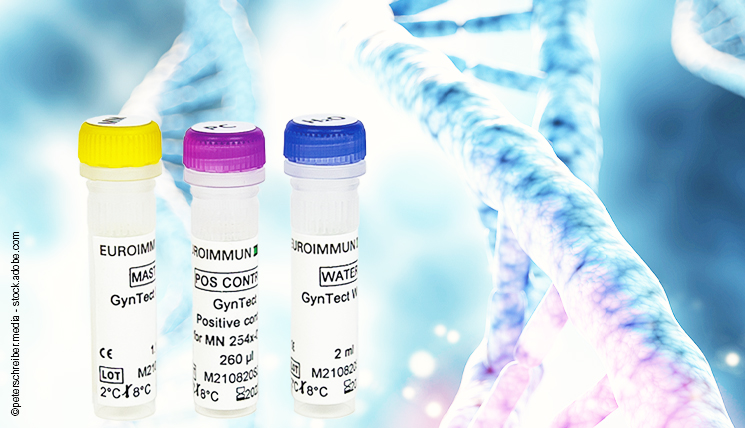Reliable and fast diagnostics of cervical cancer
While HPV tests detect infections with HPV and thus allow drawing conclusions on the risk of developing cervical cancer, the GynTect® test can be used in a second step to clarify whether affected cells are actually already developing into cancer cells based on the detection of epigenetic markers.
With over 500,000 new cases each year, cervical cancer is one of the most frequent cancers in women worldwide. It is caused by infections with human papillomaviruses (HPV) which are sexually transmitted. More than 80% of the world population become infected at some point in their lives, but remain asymptomatic.
There are over 100 different HPV variants (subtypes), 30 of which infect the anogenital area. However, only infections with high-risk HPV, which include 18 different subtypes, cause the formation of malignant tumours of the cervix, while low-risk HPV only cause harmless, if annoying genital warts.
Depending on the country and age of the patient, cervical cancer screening is based on the cytological Pap test, on a combination of HPV and Pap tests, or on HPV testing only. The Pap test includes the microscopical investigation of a smear from the cervix for cell changes. In Germany, the screening by Pap tests has been supplemented by molecular HPV tests since 2020 and is no longer performed annually, but only every three to five years.
Using the HPV test EUROArray HPV, the 30 clinically relevant HPV subtypes which are linked to the development of malignancy in anogenital tissues can be detected and identified. Genetic material obtained from the cells of a swab sample is used as sample material. If a woman is infected with HPV, the doctor can reliably identify the present virus subtypes and thus assess her individual cancer risk. Especially infections that persist for months or infections with multiple high-risk HPV types are associated with an increased risk of cervical cancer. Due to the new screening strategy, however, more and more women are confronted with a positive HPV test result, which may cause them to worry about having cancer. Nonetheless, in many affected women, HPV infections are self-limiting and no cause for concern or even for costly surgical treatment. The thing is: No HPV test is able to predict the exact evolution of an HPV infection.
This is where GynTect® comes into play. The innovative strength of this test is the reliable recognition of DNA methylation (epigenetic markers) in six specific genes which is only present during the development of cancer cells in the cervix. In this way, malignant changes due to HPV infection, which may develop into cancer, can be detected by GynTect® and distinguished from HPV infections that do not cause cancer.
Correspondingly, the GynTect® test helps women with a positive HPV or conspicuous cytological finding to quickly obtain certainty on their risk of developing cancer. At best, the test result is negative and thus gives the desired early all-clear: no cancer despite the HPV infection. In this way, GynTect® can help to spare the patient unnecessary surgical tissue removal and constitutes a good complement to the concept of watchful waiting.

